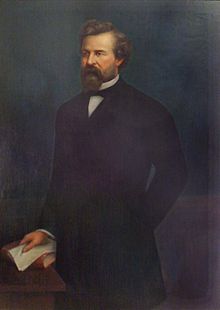| George Wythe McCook | |
|---|---|
 Painting at Daniel McCook House Painting at Daniel McCook House | |
| 4th Ohio Attorney General | |
| In office January 9, 1854 – January 14, 1856 | |
| Governor | William Medill |
| Preceded by | George Ellis Pugh |
| Succeeded by | Francis D. Kimball |
| Personal details | |
| Born | (1821-12-21)December 21, 1821 Canonsburg, Pennsylvania, US |
| Died | December 28, 1877(1877-12-28) (aged 56) Steubenville, Ohio, US |
| Resting place | Union Cemetery, Steubenville |
| Political party | Democratic |
| Relations | Fighting McCooks |
| Military service | |
| Allegiance | Union |
| Branch/service | Union Army |
| Years of service | 1846-1866 |
| Rank | Ohio Adjutant General |
| Commands | Fort Delaware |
| Battles/wars | Mexican-American War American Civil War |
George Wythe McCook (November 21, 1821 – December 28, 1877) was a lawyer, politician, and soldier from the state of Ohio in the United States. He was the Ohio Attorney General and an officer in the Union Army during the American Civil War. He was a member of the famed Fighting McCooks, a prominent military family that contributed more than a dozen officers to the war effort.
Early life and career
McCook was born in Canonsburg, Pennsylvania, the son of a local attorney, Daniel McCook and Martha Latimer McCook. He was one of an eventual twelve children (nine boys and three girls). In 1826 the family moved to New Lisbon, Ohio, and then to Carrollton. He graduated from Ohio University and subsequently studied law with Edwin M. Stanton, and afterward became his partner. He served as an officer in the 3rd Ohio Infantry Regiment throughout the Mexican War, and returned from the war as its commander.
He was the Attorney General of Ohio from 1854 to 1856 and edited the first volume of the "Ohio State Reports." During his term in office, McCook specialized in railroad law. His skill in this area was noticed by the Steubenville and Indiana Railroad Company, and after his term ended, the company sent him to Europe on legal business.
McCook was a delegate to the 1860 Democratic National Convention in Charleston, South Carolina.
Civil War service
At the war's outset, McCook was one of the first four brigadier generals selected by the Governor of Ohio to command the troops from that state, but, because of impaired health from his Mexican service, McCook was prevented from accepting that post. Later, he was appointed as the lieutenant colonel of the 2nd Ohio Infantry, and spent much of the war recruiting volunteers for several new regiments. He was named by Governor William Dennison as the Ohio Adjutant General.
Later, he accepted an appointment as the colonel of the 157th Ohio Infantry, Hundred Days Regiment. He was second-in-command of the prisoner-of-war camp at Fort Delaware.
At the end of the war, he received the brevet rank of brigadier general, dating from March 13, 1865.
Postbellum career
After the war, McCook resumed his legal practice and political career. In 1871 he was the Democratic candidate for governor of Ohio. However, he lost to another former Union Army officer, Col. Edward F. Noyes, by more than twenty thousand votes.
He, with the Rev. Dr. Charles Beatty, were the largest contributors to the erection of the Second Presbyterian Church at Steubenville, Ohio, of which he was a trustee.
McCook died in Steubenville and is buried in Union Cemetery.
See also
Notes
- ^ Appleton's Cyclopedia. Retrieved 2008-10-20
- Office of the Ohio Attorney General Retrieved 2008-10-20
- Cincinnati Civil War Round Table Archived 2009-03-26 at the Wayback Machine Retrieved 2008-10-20.
- Carroll County, Ohio, history webpage Archived 2008-07-05 at the Wayback Machine Retrieved 2008-10-20
- The Political Graveyard Archived 2010-02-05 at the Wayback Machine Retrieved 2008-10-20
References
- Wilson, J. G.; Fiske, J., eds. (1900). "McCook, George" . Appletons' Cyclopædia of American Biography. New York: D. Appleton.
| Legal offices | ||
|---|---|---|
| Preceded byGeorge Ellis Pugh | Attorney General of Ohio 1854-1856 |
Succeeded byFrancis D. Kimball |
| Party political offices | ||
| Preceded byGeorge H. Pendleton | Democratic Party nominee for Governor of Ohio 1871 |
Succeeded byWilliam Allen |
- 1821 births
- 1877 deaths
- People from Canonsburg, Pennsylvania
- People from Lisbon, Ohio
- Union army colonels
- People of Ohio in the American Civil War
- United States Army officers
- American military personnel of the Mexican–American War
- McCook family
- Ohio lawyers
- Ohio Democrats
- Ohio attorneys general
- Ohio University alumni
- Burials at Union Cemetery-Beatty Park
- 19th-century Ohio politicians
- People from Carrollton, Ohio
